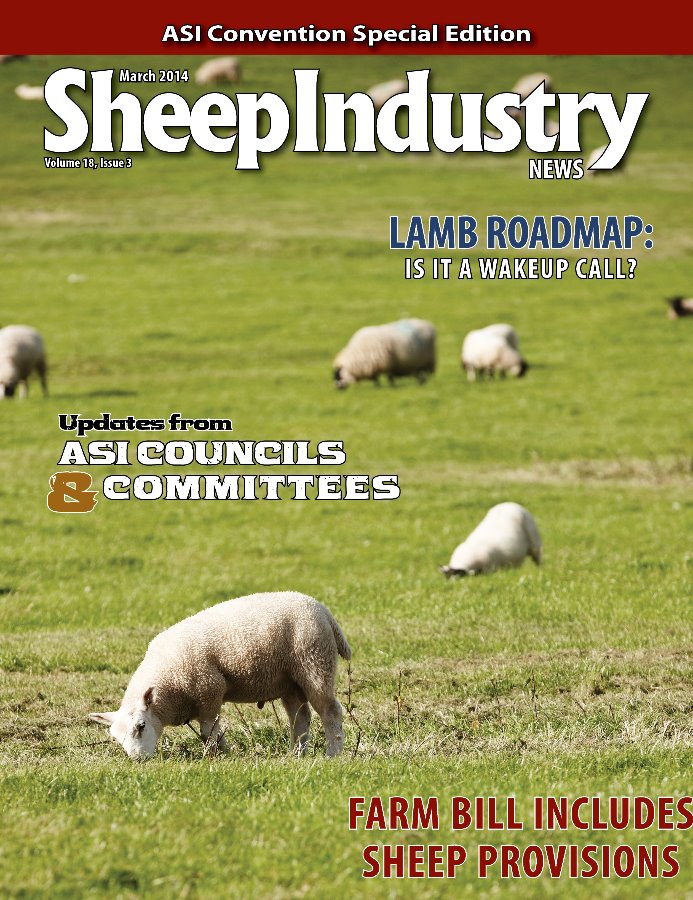
- March 2015
- President’s Notes
- Nearly 600 Participated in ASI Convention to Mark 150th Anniversary
- Smith: Animal Ag Needs to Protect Itself
- ASI Awards: Dedication to Sheep Industry
- Avalos Urges ASI to Support Livestock Reporting
- Wool Council Updated on Programs
- Wool Excellence: Mehta, Kott Honored for Service to Industry
- Market Report
- H-2A ‘Special Procedures’ Vital to Industry
- Breed Research Reported to PERC
- Legislative Council Shifts Spring D.C. Trip
- Let’s Grow Committee Begins to Build
- Pfliger Takes Reins as ASI President
- Buchholz, Ebert Elected to ASI Executive Board
- Stakeholder Committee Formed to Draft Sheep Station Defense
- Animal Health Updated on Bighorns, Scrapie
- Emerging Entrepreneurs Gain Momentum
- Sheep News Briefs
- Classified Ads
ASI Develops Legislative Action Center
A Legislative Action Center page has been added to the ASI website – www.sheepusa.org. For ease of access, it can be opened from the home page by clicking on the button labeled Legislative Action Center. Additions to the website offer easy access for locating members of Congress, legislative schedules and members of various committees and subcommittees. A Priority Issues sub-page has also been added where ASI members will be able to easily access Federal Register postings and submit comments and it will be updated as issues arise.
Sheep Center Adds Board Members
The National Sheep Industry Improvement Center (NSIIC) welcomed two new board members at its annual meeting in Reno. New board members Laurie Hubbard (Penn.) and Cody Hiemke (Wisc.) replaced outgoing members Greg Ahart (Calif.) and Rochelle Oxarango (Idaho). Hubbard is a direct marketer in Pennsylvania and is representing producers on the board, while Hiemke is manager for the Niman Ranch lamb program representing marketing. The Sheep Center welcomes comments and suggestions as to areas of priority for awarding grants within the sheep industry. Comments and/or suggestions can be forwarded to [email protected].
TPP Negotiations Enter ‘Endgame’
Last year’s Trans-Pacific Partnership (TPP) negotiations were marked by Japan’s unwillingness to lower tariffs and restrictions on key agricultural and auto markets, but the tide could be changing. Darci Vetter, chief agricultural negotiator for the Office of the U.S. Trade Representative, says that negotiations are “entering the end game” although the timeline will be decided when tough issues can be resolved. The TPP is a regional trade agreement between 12 Pacific Rim countries including Australia, Brunei Darussalam, Canada, Chile, Japan, Malaysia, Mexico, New Zealand, Peru, Singapore, Vietnam and the United States, which account for nearly 40 percent of global Gross Domestic Product. Peter Orwick, executive director at ASI, said this agreement would opening up access for American lamb into the Japanese market, however, “it does threaten the U.S. wool textile industry if there are not yarn forward origin rules implemented,” he added.
COOL Rule Lawsuit is Dismissed
The U.S. District court dismissed a lawsuit brought by meat interest groups against the USDA regarding Country-of-Origin Labeling (COOL). The papers ending the suit were filed in the U.S. District Court for the District of Columbia, ending American Meat Institute et al. v. USDA et al., originally filed in July 2013. After several back-and-forth meetings in the courtroom, including a requested injunction against the rule, a court of appeals denied rehearing of the suit in October 2014. The meat groups had said COOL violates the constitution by mandating speech without a public interest. They also argued the policy creates unnecessary and costly burdens for producers and packers. The World Trade Organization (WTO) dispute on the rule continues.

